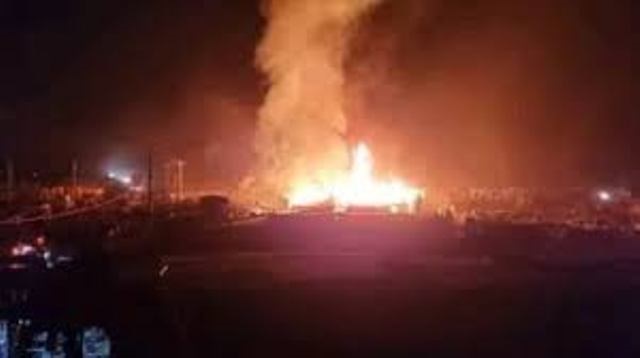15 killed in Pak’s Airstrikes in Afghanistan, Taliban Vow Retaliation | Read
At least 15 people, including women and children, were killed after Pakistan conducted late-night airstrikes on suspected terror targets in neighbouring Afghanistan on Tuesday, security officials said. The Taliban condemned the “unilateral” airstrikes and warned of retaliation.
The strikes targeted Pakistani Taliban and were carried out in a mountainous area in Paktika province bordering Pakistan, officials told The Associated Press. According to Afghan media reports, the strikes targeted seven villages, with one of them being completely destroyed. A training facility was dismantled and some terrorists were also killed in the strikes, officials said.
Taliban’s Defence Ministry condemned Pakistan’s airstrikes, saying they targeted civilians and that most of the victims were refugees from the Waziristan region.
“The Islamic Emirate of Afghanistan considers this a brutal act against all international principles and blatant aggression and strongly condemns it,” the ministry said while referring to Afghanistan’s official name.
Islamabad often makes claims that the Pakistani Taliban or Tehreek-e-Taliban Pakistan (TTP) conduct attacks on its country from Afghan soil, a charge Kabul has repeatedly denied.
Calling the airstrikes a “cowardly act”, the ministry said that Pakistan’s “unilateral airstrikes” were not a solution to any issue and said it “considered the defence of its territory and territory to be its inalienable right”.
The strikes came hours after Pakistan’s special representative for Afghanistan, Mohammad Sadiq, met with the Taliban leadership in Kabul to discuss ways of boosting ties.
During the visit, Sadiq met with Afghanistan’s acting interior minister, Sirajuddin Haqqani, whose uncle Khalil Haqqani recently died in a suicide bombing that was claimed by a regional affiliate of the Islamic State group. Khalil Haqqani served as the minister for refugees and repatriation.
The Taliban seized power in Afghanistan in 2021 and the Taliban takeover in the country has emboldened the TTP, whose leaders and fighters are hiding in Afghanistan.
The TTP has stepped up attacks on Pakistani soldiers and police since November 2022, when it unilaterally ended a ceasefire with the government after the failure of months of talks hosted by the Afghanistan government in Kabul. In recent months, the group has killed and wounded dozens of soldiers in attacks inside the country.
In March, Pakistani air force jets carried airstrikes against TTP in the border regions of Khost and Paktika in Afghanistan in response to a deadly attack on Pakistani forces, which resulted in the killing of seven soldiers, including a Lieutenant Colonel and a Captain.
TTP’s Hafiz Gul Bahadur Group claimed the attack.
At least 15 individuals, including women and children, lost their lives following late-night airstrikes conducted by Pakistan on suspected terrorist locations in neighbouring Afghanistan on Tuesday, according to security officials. The Taliban condemned these “unilateral” strikes and issued a warning of potential retaliation.
The airstrikes targeted the Pakistani Taliban and were executed in a mountainous region of Paktika province, which borders Pakistan, as reported by officials to The Associated Press. Afghan media indicated that seven villages were hit, with one being completely destroyed. Additionally, a training facility was dismantled and several militants were reportedly killed during the operation.
The Taliban’s Defence Ministry criticized Pakistan’s airstrikes, claiming they targeted civilians and that many victims were refugees from the Waziristan region. They described the strikes as a brutal act against international principles and a blatant form of aggression, stating, “The Islamic Emirate of Afghanistan strongly condemns this.”
Pakistan frequently asserts that the Pakistani Taliban, or Tehreek-e-Taliban Pakistan (TTP), launch attacks from Afghan territory, a claim that Kabul has consistently rebuffed. The Taliban characterized the airstrikes as a “cowardly act,” insisting that Pakistan’s unilateral actions are not a viable solution and emphasized its right to defend its territory.
These strikes followed a meeting in Kabul between Pakistan’s special representative for Afghanistan, Mohammad Sadiq, and Taliban leaders, where they discussed enhancing bilateral relations. During his visit, Sadiq met with Afghanistan’s acting interior minister, Sirajuddin Haqqani, whose uncle Khalil Haqqani recently died in a suicide bombing claimed by a local affiliate of the Islamic State group. Khalil Haqqani served as the minister for refugees and repatriation.
Since the Taliban takeover of Afghanistan in 2021, the TTP has become emboldened, with its leaders and fighters taking refuge in the country. Following the termination of a ceasefire in November 2022, the TTP has escalated attacks on Pakistani military and police forces, resulting in numerous casualties among soldiers.
In March, Pakistani air force jets conducted airstrikes against the TTP in the border areas of Khost and Paktika in Afghanistan in response to a fatal attack on Pakistani forces that killed seven soldiers, including a Lieutenant Colonel and a Captain. The Hafiz Gul Bahadur Group of the TTP claimed responsibility for that attack.


Comments are closed.